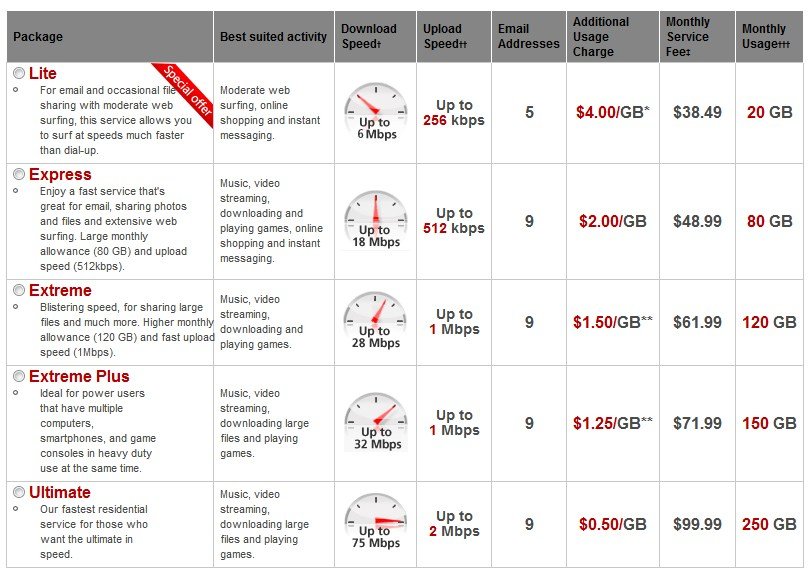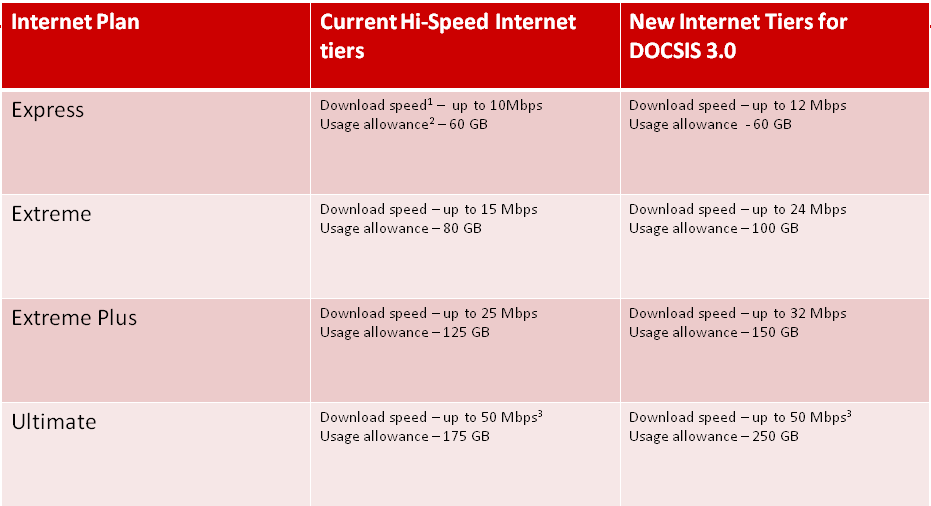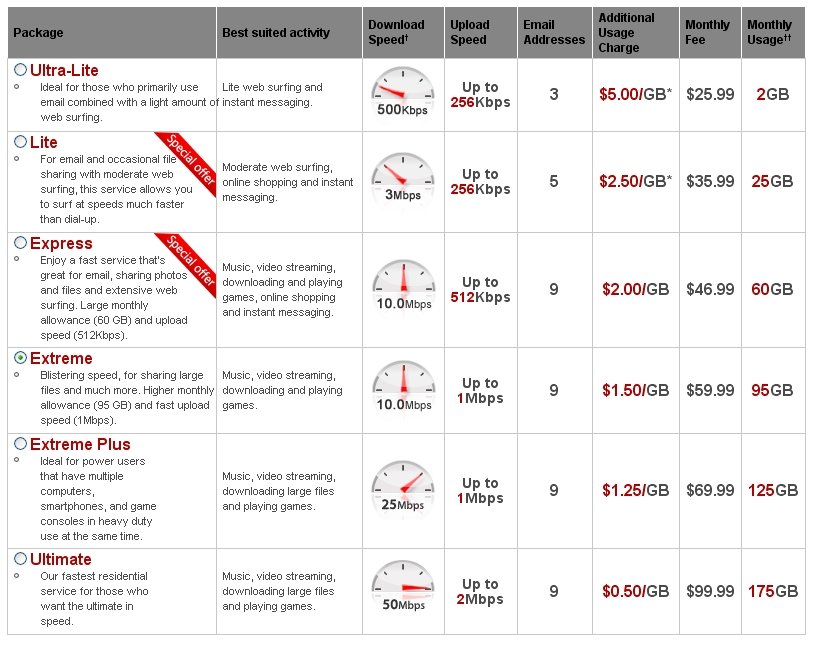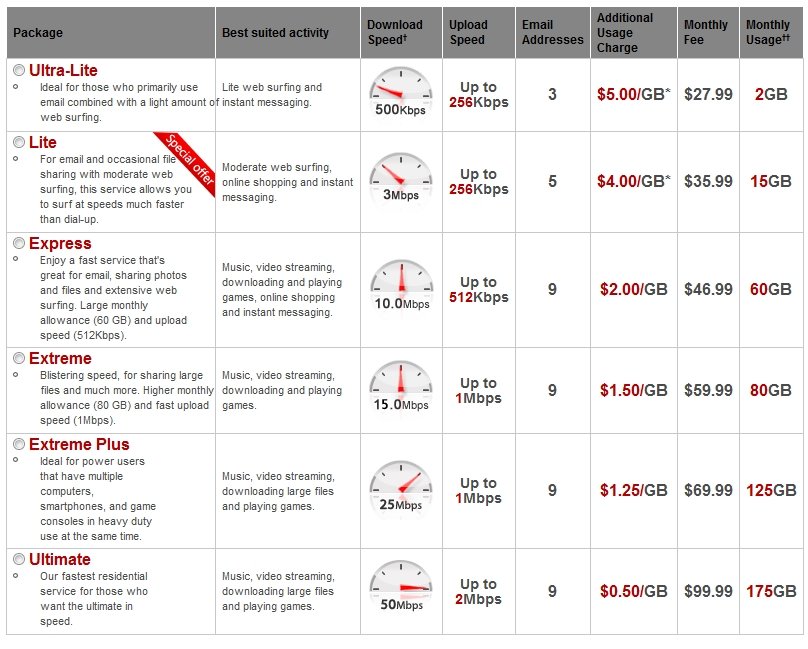 Rogers Communications Monday began their latest Internet Overcharging scheme on Canadian broadband customers — they’ve doubled the maximum overlimit penalty from $25 to $50 for customers who exceed the cable company’s arbitrary broadband usage allowances.
Rogers Communications Monday began their latest Internet Overcharging scheme on Canadian broadband customers — they’ve doubled the maximum overlimit penalty from $25 to $50 for customers who exceed the cable company’s arbitrary broadband usage allowances.
It’s a fact of life for anyone living with a provider that wants to charge too much for broadband service. Like the credit card industry, the tricks and traps keep on coming as providers seek to monetize everything they can to extract as much money from customers as possible.
For some providers like Bell, the trick is to gradually reduce your usage allowance, exposing more and more customers to overlimit fees (the company even sells an insurance plan to protect you from their audacious pricing). For others, the fee trap comes from gradually increasing the maximum overlimit fee until there is no maximum.
Rogers has chosen the latter method, effectively passing through massive rate increases for Canadians that dare to use too much.
Originally, Rogers Extreme service was priced at $60 a month for 10/1 Mbps service with a 95 GB cap. Customers who traditionally exceeded that paid $1.50 per gigabyte in overlimit fees. With a $25 maximum penalty, many customers just accepted the fee as their ticket to unlimited broadband. Now, Rogers has conceded a quarter to customers, lowering the per gigabyte penalty rate to $1.25. But for customers who still regularly exceed their allowance, the charges really add up. That $60 a month now balloons to $110 per month for exactly the same unlimited service customers used to enjoy for less.
That forces customers like the Globe & Mail’s Michael Snider to make some choices:
- Reduce usage — a win for Rogers and broadband rationing for him;
- Upgrade to a higher tier service plan to get a better allowance — a win for Rogers and a higher bill for Snider. Extreme Plus has an allowance of 125 GB, just a 30 GB difference, for an additional $10 a month;
- Grin and bear it — a win for Rogers and a future that guarantees him bigger bills indefinitely.
This is the type of move that may force customers who regularly approach or exceed their cap to seriously consider upgrading their service package.If that’s part of Rogers’ plan, it worked.
I just bumped up my service from Extreme to Extreme Plus (if you do the same, inquire about the promotion that offers $20 off Internet for the first six months if you lock in for a year — that’s upgrading only). So now, I’ll be getting 25-Mb download speeds (still a measly 1-Mb upload, though) and a cap of 125 GB a month and, once the promotion ends, will be paying $14 a month more ($10 for the service and $7 for the modem rather than $3).
Call me a sucker, but twice in the past year I have exceeded my 95 GB cap and paid an extra $25 on my bill — once after backing up several gigs on an online backup service and once after downloading a few movies on my Xbox.
But Snider also faces, by design, the one-two punch of Internet Overcharging schemes. Not only do they fatten provider profits, they also discourage him from using his broadband service, fearing a higher bill. Even better, they discourage cord-cutting — relying on your broadband service and dropping your cable-TV package.
I am discovering that I’m actually limiting my consumption of some totally legitimate services because I’ve no desire to pay extra on my Rogers bill at the end of the month.
Take for example Microsoft Xbox’s movie service. After waiting for what seemed eons for some kind of a legit movie download service, I finally have access to one that has a list of movies that I’d actually like to see, but it’s proving too expensive to really enjoy it regularly. Reason is, downloading an HD movie eats up more than 11 GB of my bandwidth — more than 10% of my monthly allotment (before I upgraded) for one freaking movie. That goes for games too. It seems as though distributors are leaning more and more to online delivery, but at 6 or 8 GB per game, again, that eats up a lot of bandwidth.
Being the gatekeeper for broadband distribution and also being a content distributor has its advantages. If the competition starts getting too hot and heavy, locking down the distribution platform guarantees no competitor will ever get the best of you.

Whatever you do, don't turn off this modem, despite the fact you're paying for traffic it receives 24/7. Unplugging a cable modem could "damage it" according to Rogers.
Rogers claims its all about costs from increased broadband consumption, but one look at their pricing scheme proves that wrong. Rogers reserves the biggest penalties of all for its lightest-use customers. Those on Rogers Ultra-Lite tier suffer with barely-broadband speeds of 500/256 kbps with a usage limit of just 2 GB for a ridiculous $27.99 per month. The penalty rate for customers who can hardly be described as “power users” is a whopping $5 per gigabyte. They pay more because they impact the network more? How does that work?
The Canadian Radio-television and Telecommunications Commission (CRTC), the agency responsible for oversight of telecommunications services in Canada is no help. They’ve become a de facto telecom industry trade association, rubber-stamping approval of whatever providers want. The result is expensive, usage-limited, speed-throttled broadband service across the country.
What can you do to control your monthly broadband bill Rogers wants to raise? Their advice is basically to use less of the broadband service you paid good money to get. Oh, and despite the fact whenever your cable modem is powered on you are bombarded with constant traffic which eats into your allowance, whatever you do, don’t leave it unplugged — it will “damage it.” From Rogers Internet FAQ:
We STRONGLY recommend that you do not turn off your modem when you are away from home. Your cable modem has been designed to remain powered at all times. Regularly turning it off and on may result in damage to your cable modem.
…and damage to our profits.
 Rogers Communications has slightly bumped the monthly usage allowance for its “Lite” Internet plan up by 5GB per month to 20GB. The company also doubled the speed of the entry-level package from 3Mbps to 6Mbps. Upload speed remains at 256kbps.
Rogers Communications has slightly bumped the monthly usage allowance for its “Lite” Internet plan up by 5GB per month to 20GB. The company also doubled the speed of the entry-level package from 3Mbps to 6Mbps. Upload speed remains at 256kbps.

 Subscribe
Subscribe






